Advocacy Tools
While no single definition exists for advocacy, all have a common basis: it is a call for change to improve people’s lives. Advocacy is essential – it aims to address the root causes of challenges and issues that might arise and calls for the development of long-term, sustainable solutions. What do you need in order to become an advocate? Well, the most fundamental aspect of any advocacy work is a passion and commitment towards a cause! Here, we aim to share with you some advocacy tools to help you become a strong, committed and powerful advocate!
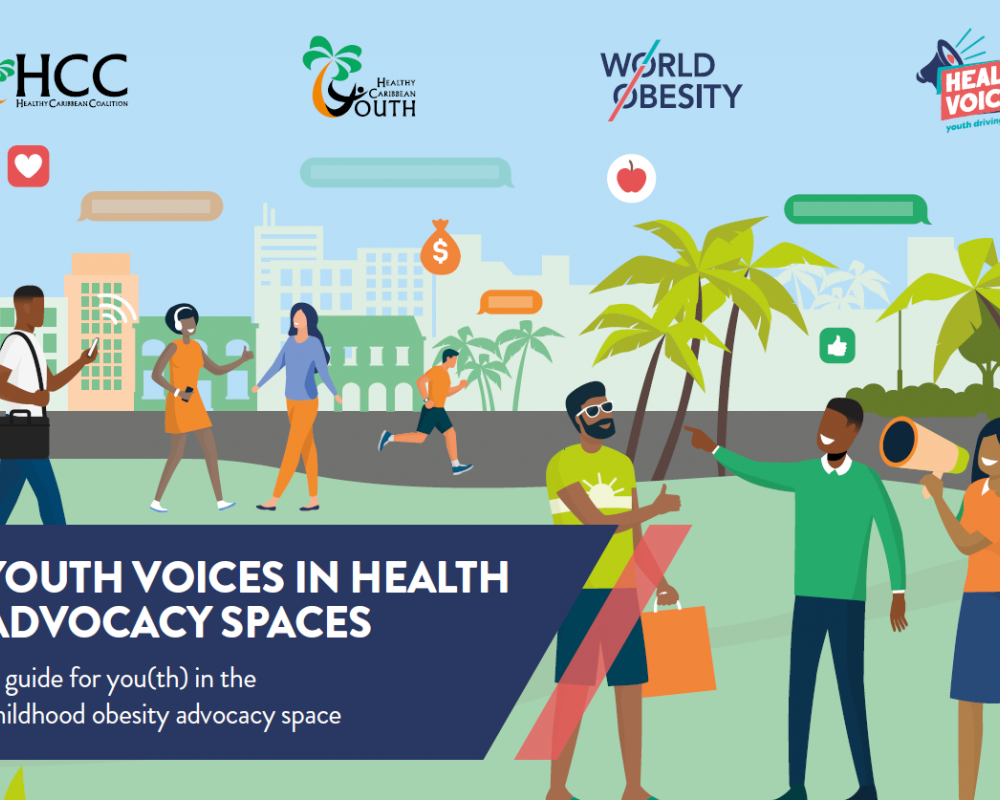
Youth Voices in Health Advocacy Spaces: A Guide for You(th) Advocates in the Childhood Obesity Space
The Healthy Caribbean Coalition (HCC) and World Obesity Federation (WOF) are pleased to present ‘Youth Voices in Health Advocacy Spaces: A Guide for You(th) Advocates in the Childhood Obesity Space’ , a new advocacy guide for young people who are ready (or have already started) to explore the world of advocacy, especially those who are interested in advocating for childhood obesity prevention and environments that prioritise and protect children’s health. The toolkit is also valuable for youth allies who are dedicated to supporting youth in their advocacy work.
Download it here.
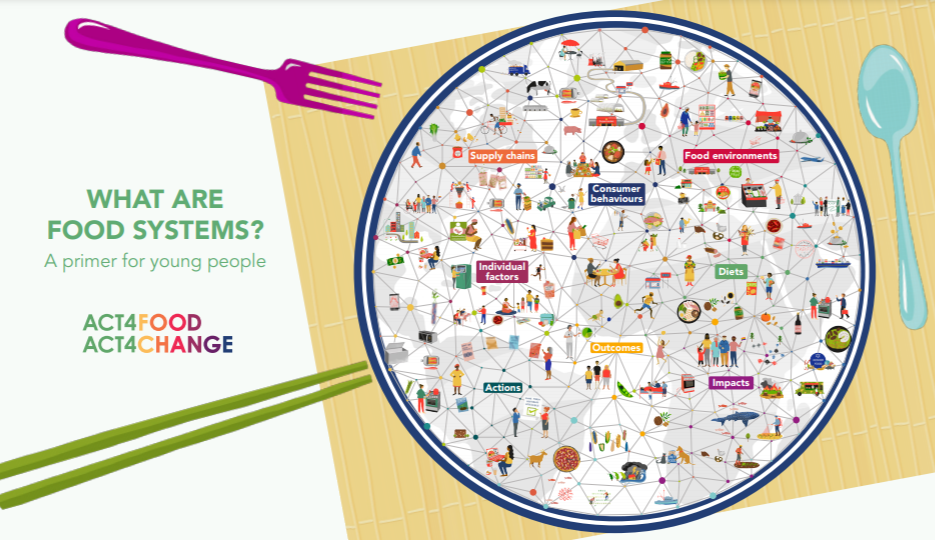
What Are Food Systems? A primer for young people.
The ‘what are food systems’ pamphlet was developed as part of the #Act4Food #Act4Change youth-led campaign that aims to mobilise and influence tangible positive change in our worlds food systems. What are food systems, how do they work for you, and how could they work better for us all?
The pamphlet breaks down the complex system into nine major parts and discusses the key drivers that govern how much food can be found, how much it costs, and the incentives that drive people to want/and or not want to eat it when available in the community.
Read on to learn more about food system drivers; supply chains; food environments; individual factors; consumer behaviours; diets; political programme & institutional actions; nutritional & health outcomes; social, economic environmental impacts.
Access it here.
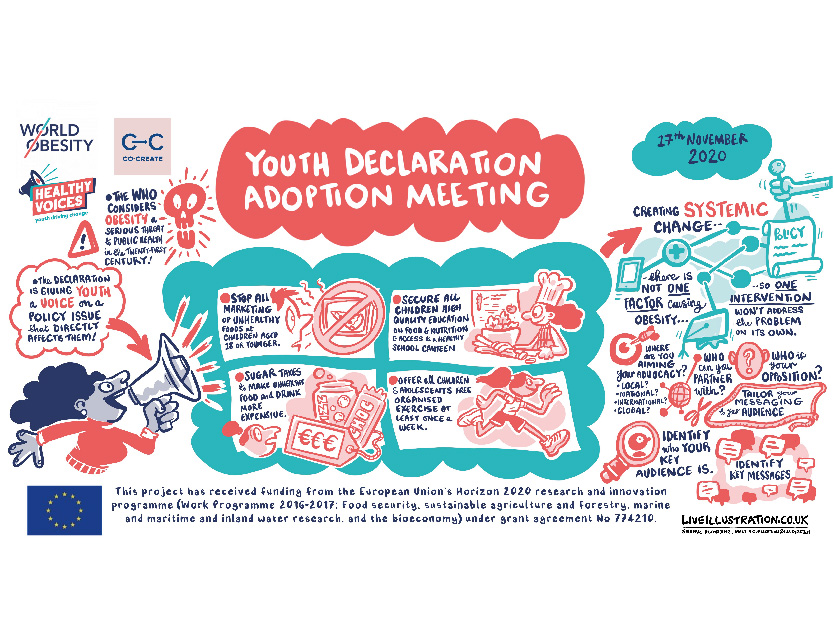
The CO-CREATE Youth Declaration: Time to Act and Ensure Good Health for All
The time to act is now! That is the message from the CO-CREATE Youth Declaration task force, urging policy makers and stakeholders to address the challenge of adolescent overweight and obesity so that everyone has the opportunity to live a healthy life.
The Task Force included 8 youths from Portugal, Poland, Norway and the Netherlands. The group had regular meetings since July 2020 to discuss what they think it is important that declaration addresses, and officially adopted the Declaration on November 17th, 2020.
“Our Youth Declaration is very important because we are taking action by showing society and the political world the importance of this issue [overweight and obesity], asking them to think about the future of our generation”, said Pedro Gonçalves, one of the Task Force.
Download the Declaration here!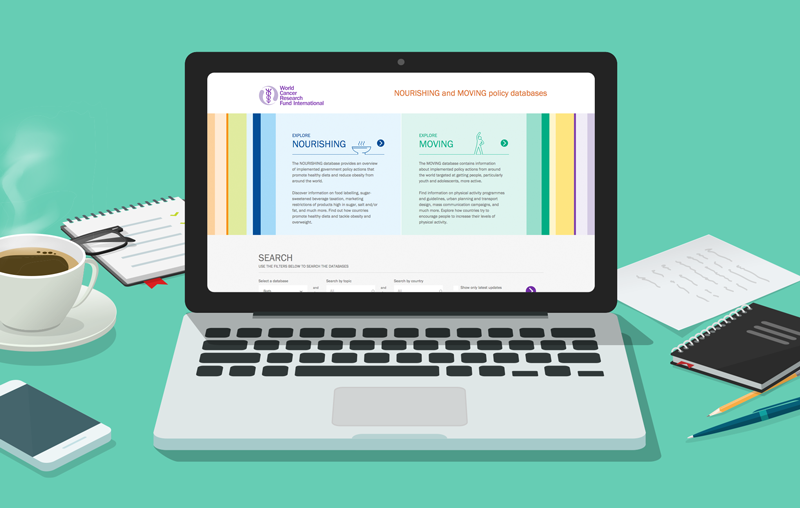
NOURISHING and MOVING Policy databases
The NOURISHING and MOVING databases collect policy actions relating to nutrition and physical activity from around the world which are implemented on a national level, and which are currently in effect. You can search the databases to find out how governments around the world have implemented to encourage people to eat healthier and move more.
NOURISHING is a database of diet-related policies, which was launched in 2015 by World Cancer Research Fund International and has been redesigned as part of the European Union CO-CREATE project – Confronting obesity: co-creating policy with youth. MOVING is a database of physical policy actions which has also been developed to complement the NOURISHING database as part of CO-CREATE. The databases are structured around the NOURISHING and MOVING policy frameworks.
Both databases also include evaluations of policies, where available.
To visit the databases, please visit https://policydatabase.wcrf.org
You can also read the summaries on NOURISHING and MOVING.
The MOVING framework
World Cancer Research Fund International developed the MOVING policy framework focused on promoting physical activity as part of its involvement in the EU’s CO-CREATE project. MOVING recognises that government action is needed in four areas: active societies, active environments, active people and active systems. The evidence shows that each domain is important in influencing how active we are.
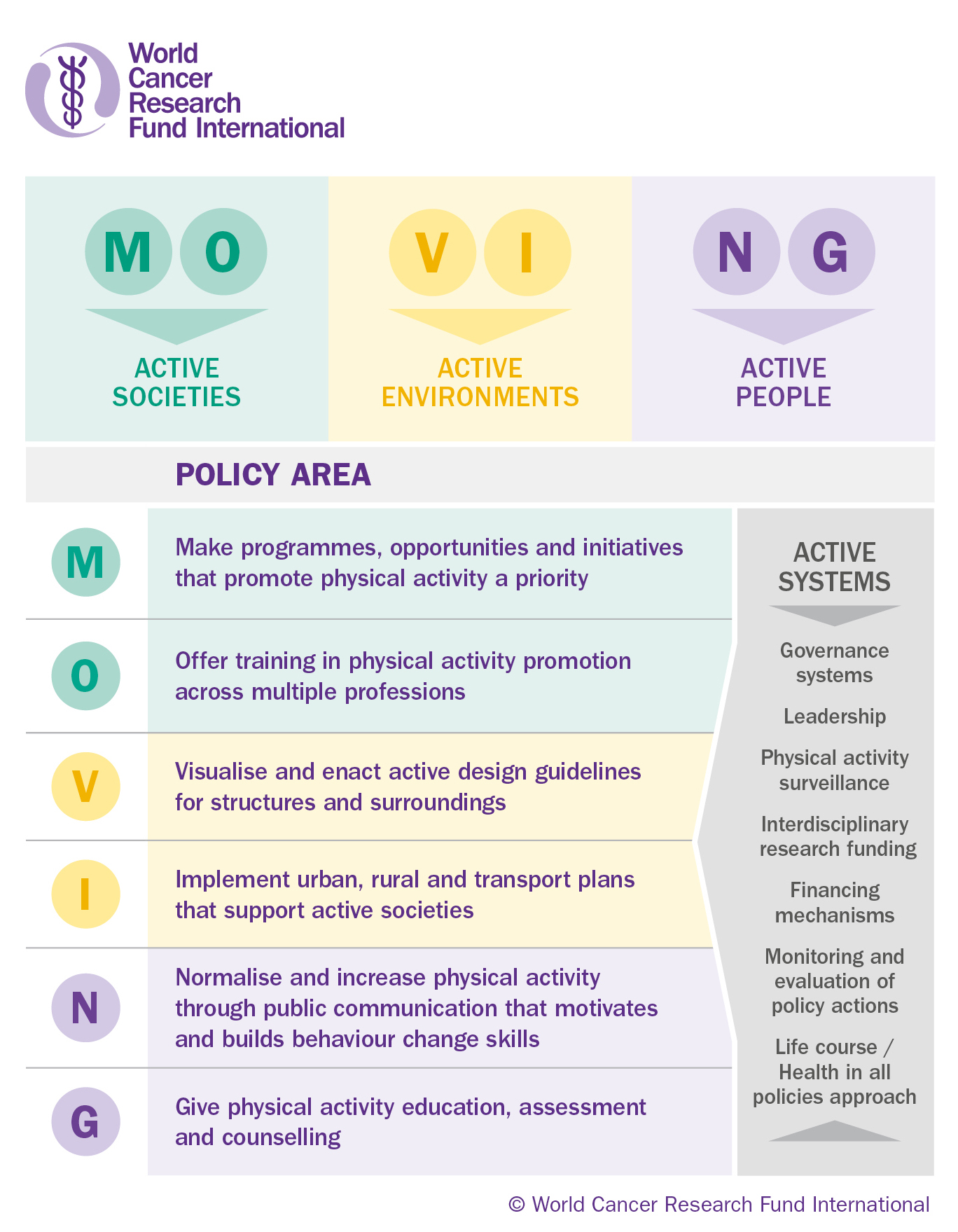
Within the framework, there are six policy areas. Each letter of the word MOVING relates to a policy area where governments should take action. These include programmes to promote activity across the life course, including at schools and workplaces; active travel through walking and cycling infrastructure, and access to green spaces; and educating everyone about the benefits of living an active life.
The NOURISHING framework
To encourage action to promote healthy diets and address obesity, World Cancer Research Fund International created the NOURISHING policy framework. NOURISHING recognises that governments need to take action in three areas: food environment, food system and behaviour change communication. The evidence shows that each area is important in influencing how and what we eat.
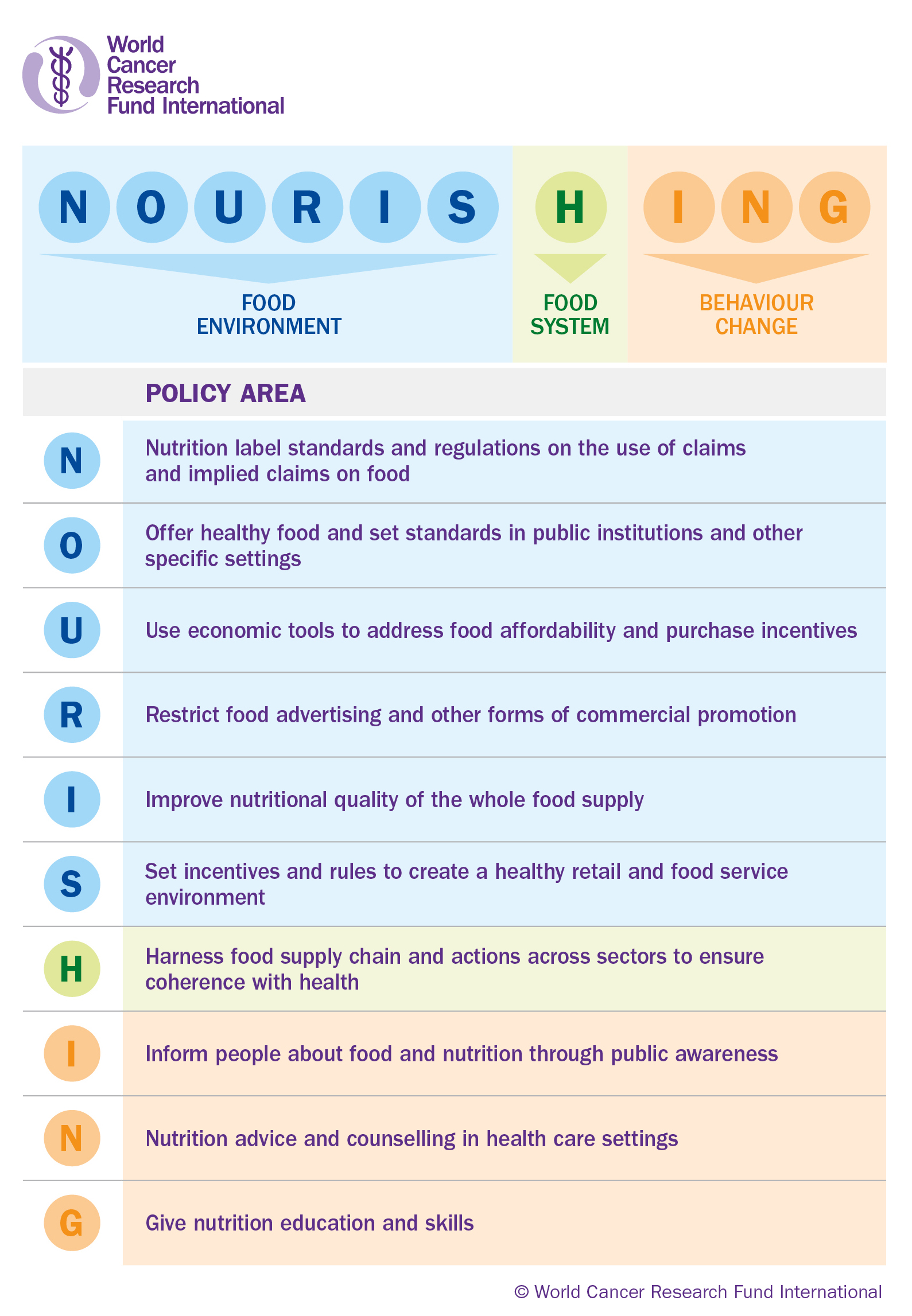
Within the framework there are ten evidence-informed policy areas – each letter of the NOURISHING framework represents an area of action. To develop an effective response to unhealthy eating, governments should implement policy actions from all of the ten policy areas. Discover information on food labelling, sugar-sweetened beverage taxation, marketing restrictions of products high in sugar, salt and/or fat, and much more.
The do's and don'ts when talking about obesity
Have you ever thought about the language we use when talking and writing about overweight and obesity, and people living with obesity? It is common to see obesity talked about in a negative way which risks reinforcing stereotypes, simplifying the causes of obesity and contributing to weight stigma. Read our guidelines to learn how to use proper language when talking about obesity!
Download them hereImage use and obesity: recommendations
Have you ever thought about how the images that are used to depict overweight and obesity may be perceived? Many images commonly used, for instance in the media, reinforce many of the stereotype about obesity, and suggest that people with obesity are lazy, greed or lack will power. Read our guidelines to learn how to use appropriate, non-stigmatising images when when portraying obesity!
Download them hereOther resources and toolkits
Below is a list of some useful advocacy resources and toolkits from colleagues around the world. Should there be a specific resource or information you would like to see featured here, please get in touch with us!
Plan International is a development and humanitarian organisation that aims to advance children's rights and equality for girls. They aim to work collaboratively with children, young people, supporters and partners.
In collaboration with A World at School and the Youth Advocacy Group of the Global Education First Initiative, they developed an advocacy toolkit for young people, by young people.
Rightfully, they define advocacy as:
A call for change + the voice of those who want to change + evidence = ADVOCACY
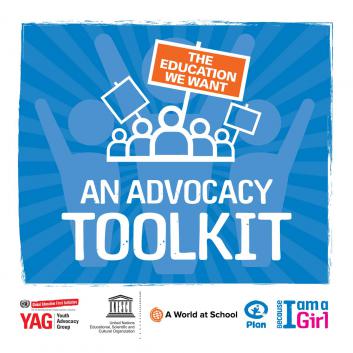
This toolkit has all the tips and tricks you need to help you carry out a successful advocacy campaign! Click here to access it.
Globally, non-communicable diseases (NCDs) are the most common cause of death and disability. In fact, they account for 70% of all deaths!
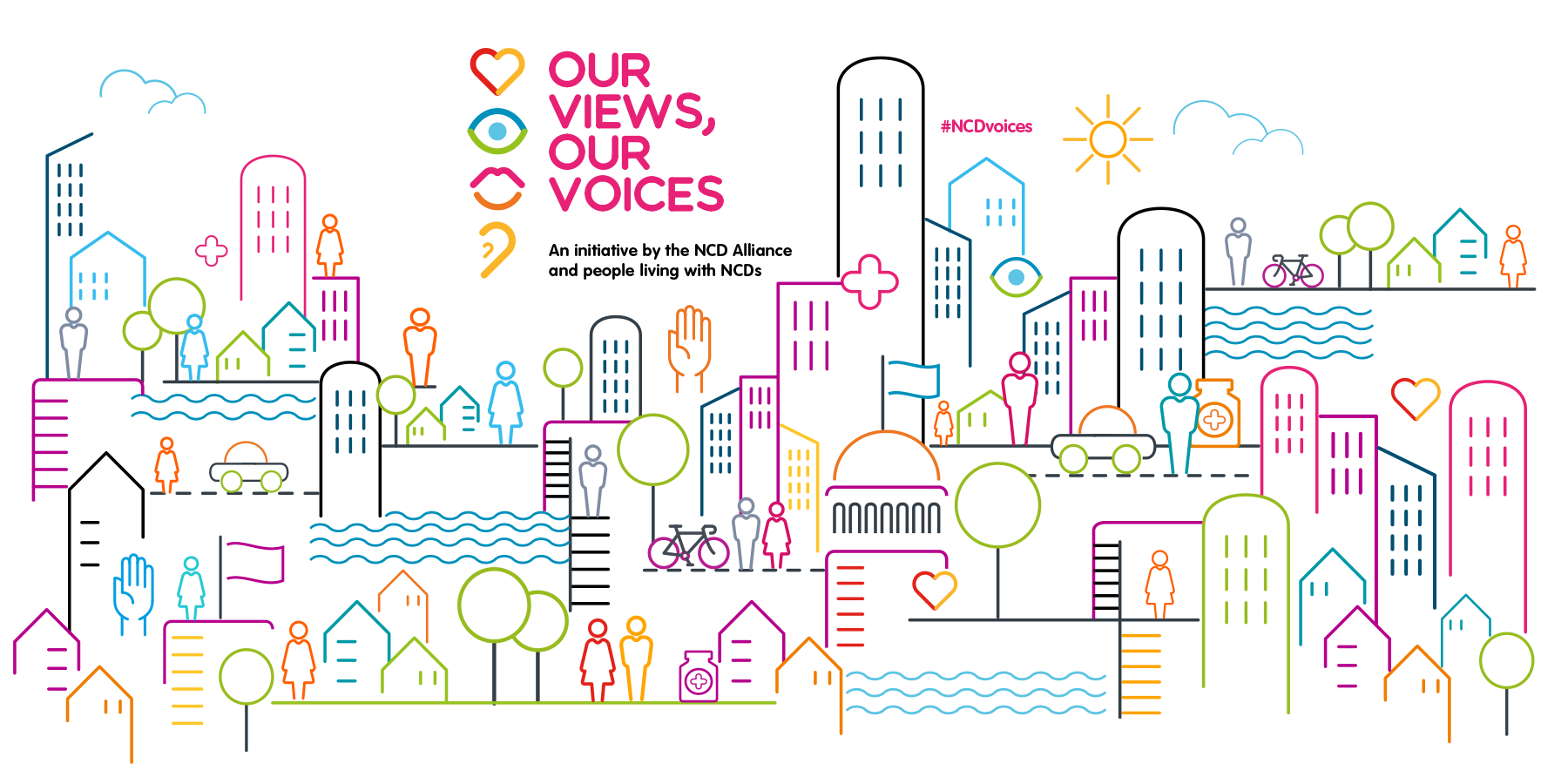
As part of the Our Views, Our Voices initiative, the NCD Alliance developed an Advocacy Agenda of people living with NCDs. Through a participatory process, it encouraged people living and directly affected by NCDs to have their voices heard and help shape the NCD Agenda. Most importantly, it helped to better understand the needs, challenges and establish some key priorities. After a long consultation process involving people from all over the globe, the Agenda calls for action in four key areas:
-
Human Right and Social Justice
-
Prevention
-
Treatment, Care and Support
-
Meaningful Involvement
Want to read the formulated recommendations? Click here to access the full Agenda!
The Our Views, Our Voices initiative led up by the NCD Alliance aims to "put people first in the NCD response." What does this mean in practice? NCD Alliance wants to attempt to end stigma and discrimination while simultaneously sharing skills and knowledge for poeple living with NCDs in order for them to become active agents of change.

As part of this initiative, they developed Community Conversations which are "structured, small group discussions with members of a community, designed to better understand their thoughts and views on particular topics."
Interested in using their model? Click here to access their full guide which provides all the necessary information and materials to host community conversations.
Over the past decades, social media has changed immensely. Among many things, it allows a group or a collective to share messages to different stakeholders through public channels.
.png)
Many different social media platforms exist, and each of them can be used based on specific pre-defined objectives and aims. A commonality, however, is the need to ensure that the dialogues that are initiated and driven by social media are constructive and respect all users' views.
Learn how to powerfully yet appropriately use social media to achieve an objective by reading this guide developed by the NCD Alliance.
